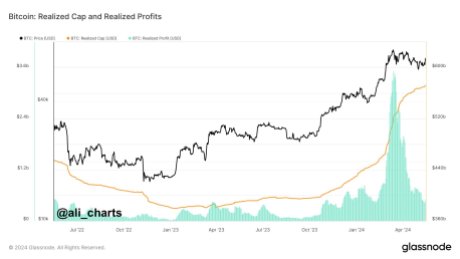For analysts and investors alike, comprehending the variables that influence price action in the complex world of cryptocurrency markets is essential. Ali Martinez, a well-known cryptocurrency expert, has recently provided insights into the fluctuations in the price of Bitcoin by applying the basic economic theory of supply and demand.
Understanding Bitcoin Prices Through Supply And Demand
It is worth noting that any asset’s price movement, including cryptocurrencies, is determined by the fundamental rules of supply and demand. An asset’s price tends to decrease when supply outpaces demand, while prices typically increase when supply cannot keep up with demand.
Related Reading
Thus, Ali Martinez has deduced the crypto asset’s price and holders’ behaviour by applying the method and other on-chain metrics. Martinez’s analysis demonstrates how fluctuations in the market’s buying interest and the availability of Bitcoin are key factors influencing its price trajectory.
According to Martinez, Bitcoin’s Realized Cap witnessed a significant increase mid-way through March when BTC hit a new all-time high of $73,000. This indicated that the majority of BTC’s long-term holders were likely yielding gains at the time.
As a result, several investors sold their holdings, which led to a sharp rise in realized profits. Following realized profits in March, long-term holders felt safe adding over 70,000 BTC to their investments at these prices.

Meanwhile, when the market’s growing supply of Bitcoin exceeded demand, the coin saw a substantial correction from the $73,000 level to the $57,000 level.
Given that short-term holders are more likely to sell their holdings due to price volatility, this decline took Bitcoin below its realized price for short-term holders, inciting fear in the market. However, despite investors’ concerns, the short-term holder’s Realized Price at the $65,500 level acted as an accumulation point.
On the basis of this principle, Martinez believes the likelihood of Bitcoin continuing its upward trajectory will only increase when demand for the cryptocurrency starts to exceed the supply of BTC accessible in the market.
Using BTC On Exchanges To Support The Principles
Martinez has underscored that the available BTC on crypto exchanges can be used to confirm these supply and demand laws. He further noted that over 30,000 BTC have been moved to private wallets for long-term storage in May, indicating confidence among holders in the potential worth of Bitcoin.
Related Reading
Observing Bitcoin’s price using the MVRV Extreme Deviation Pricing Bands, Martinez cited a retracement above the +0.5σ pricing band at $64,600. Such an upswing has historically caused BTC to test the pricing range of 1.0σ, which is backed by increasing demand. Meanwhile, this price range at the moment is roughly lingering at $77,000.
Presently, the price of Bitcoin is trading at $66,275, indicating an over 5% increase in the past week. Although prices are up, its trading volume has declined by 24%, while its market cap is up by 0.23%.
Featured image from iStock, chart from Tradingview.com


